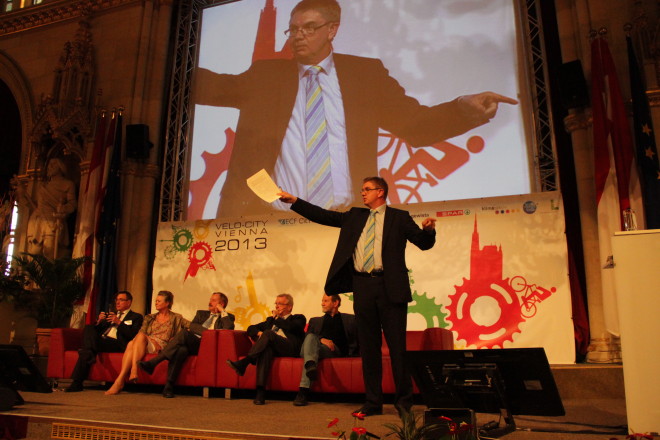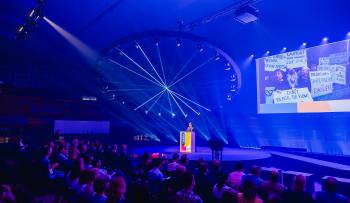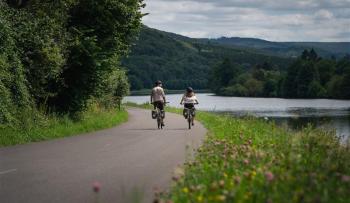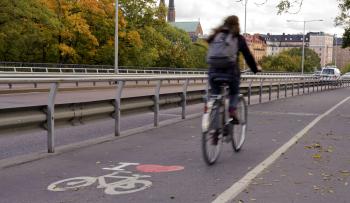
Velo-city Gone, but not forgotten: ECF Secretary General's Top 3 From Velo-city
Velo-city may be over but it has not faded the slightest from our minds here at the ECF. Now that we have all had some time to digest and reflect upon the brilliant week in Vienna we thought it was time to present some of our favorite moments, speakers, and events.
First up is ECF Secretary General Dr. Bernhard Ensink’s and his 3 most memorable moments.
Philippe Crist
OECD International Transport Forum
Velo-city 2013 Keynote Speaker
This presentation really opened the audience’s eyes when they saw the numbers that Crist and the OECD had uncovered. From 2014-2050 54 trillion trips will be made, 97% of which will be in urban areas. Crist then proposed the question, “How many will be by bicycle?” and his speech offered ideas for how to ensure that many of them are.
One of Crist’s focuses was on choice and how being able to choose both cycling and public transport makes cities more “choicefull”. Crist used Paris as an example, due to the fact that in the last decade Parisians started moving out of Paris to the surrounding suburbs. Embracing this migration by placing bike share stations next to public transport stops cities provides commuting citizens with an easy choice to leave the car at home. They can take the train or bus to the city and then cycle the remainder of the way to work.
For Ensink, Crist’s statement that bicycles are “access enhancers” really shined through. Bicycles provide access to business and services for people worldwide. A bicycle can easily and inexpensively get someone where they need to go. They enhance individuals’ mobility which in turn empowers the person. This subsequently benefits cities in which they live because “cycling is a city re-generator.”
So how many trips will be by bicycle between 2014 and 2050? If Philippe Crist’s Keynote lecture has anything to do with it, which it does, there will be many.
Vienna Bicycle Corso
“What a terrific event for everyone to recharge their batteries” said Ensink. While enlightening and interesting, after a few days of conferences and presentations about cycling it was refreshing to get all these cyclists ou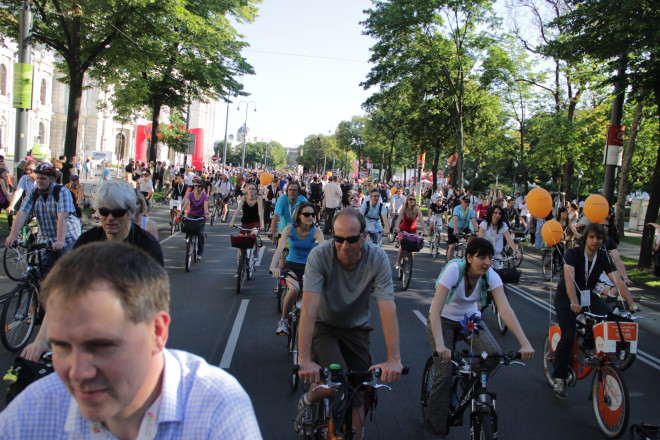 t on the regal roads of Vienna.
t on the regal roads of Vienna.
Over 4,000 cyclists participated in the parade. It was a spectacular time that is done more justice through pictures than words really. So in that case check out our Flickr page for some photos taken by ECF Communications Officer Chloe Mispelon from the basket of a bakfiets piloted by ECF Director of Development Kevin Mayne.
These types of critical mass cycle rides are always a highlight of the conference and great fun. To shut down a city for an evening and ride around with thousands of fellow cyclists is a special opportunity for all those participating.
Mobility Policies & Cycling in the European Union and its Member States
Final Discussion
At the end of a week full of ideas and talks on why cycling is so crucial to the betterment of society, the final discussion, chaired by Ensink, brought high ranking EU officials and cycling advocates to the table for a discussion over the future of doubling cycling in Europe.
The panel was composed of MEPs Mathieu Grosch (EPP), Michael Cramer (Greens), ECF Member organization presidents, Marijke van Haren from Dutch Fietsersbond, and Ulrich Sybert from German ADFC, and lastly, Commission Vice President Siim Kallas who is charge of transport.
“It was very important for the ECF and ECF members to sit down and discuss with Vice President Kallas” said Ensink.
The discussion shed light on important issues such as European funds for cycling infrastructure, the need for a European Master Plan on Cycling and a European Bicycle Officer as well as road safety. By including Vice President Kallas in the talk ECF members and Velo-city attendees were able to hear straight from the EU the hills that we must climb in order to double cycling.
However, by inviting Vice President Kallas, he was able to see the staunch and vehement dedication that ECF member and allies have. Ensink stated, “We showed him the enthusiasm, rich program, good practice, and atmosphere of Velo-city and illustrated exactly why we will continue with our goal of double cycling in Europe by 2020. This is significant.”
We hope that the ideas and momentum from the event will continue to motivate advocates, consultants, experts, scientists, politicians, and company representatives near and far as we work together to build a better future for cycling.
To assist with the reminiscing and maintain momentum, Velo-city has made all the presentations from the week available on the conference website here.
About the Author
Gregory Markus is a Communications Assistant at the ECF. He just received his Masters in European Studies from the University of Amsterdam. He currently lives in Amsterdam and is learning how to ride his bike no-handed.
- See more at: http://ecf.com/news/rtf-recognizes-importance-of-speedlimits/#sthash.Ax4...
About the Author
Gregory Markus is a Communications Assistant at the ECF. He just received his Masters in European Studies from the University of Amsterdam. He currently lives in Amsterdam and enjoys bike rides through the Dutch countryside.
About the Author
Gregory Markus is a Communications Assistant at the ECF. He just received his Masters in European Studies from the University of Amsterdam. He currently lives in Amsterdam and is learning how to ride his bike no-handed.
- See more at: http://ecf.com/news/itf-1995-2011-spending-on-transport-infrastructure-r...
- Log in to post comments
Contact the author
Recent news!
Upcoming events
Contact Us
Avenue des Arts, 7-8
Postal address: Rue de la Charité, 22
1210 Brussels, Belgium

